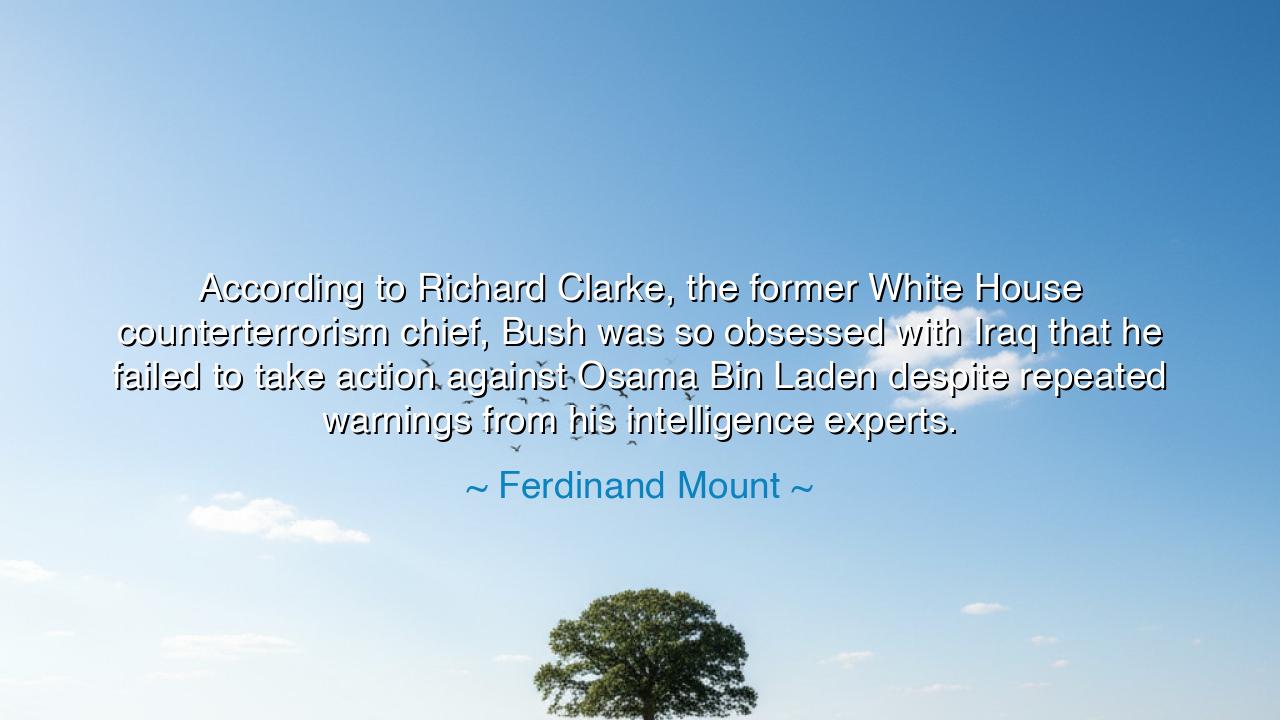
According to Richard Clarke, the former White House
According to Richard Clarke, the former White House counterterrorism chief, Bush was so obsessed with Iraq that he failed to take action against Osama Bin Laden despite repeated warnings from his intelligence experts.






In the chronicles of power and tragedy, there are moments when the blindness of obsession becomes the undoing of empires. In this truth lies the heart of Ferdinand Mount’s observation: “According to Richard Clarke, the former White House counterterrorism chief, Bush was so obsessed with Iraq that he failed to take action against Osama Bin Laden despite repeated warnings from his intelligence experts.” These words are not merely political commentary—they are a solemn reflection on the eternal conflict between focus and fixation, between wisdom and will, between the leader who listens and the one who is lost in the echo of his own certainty.
In the ancient world, philosophers taught that every ruler must master his mind before he commands men. For once the ruler becomes possessed by a single idea—whether glory, revenge, or conquest—he ceases to see the living world before him. Mount’s words, drawn from the testimony of Richard Clarke, serve as a warning against such blindness. Clarke, who stood at the threshold of unfolding catastrophe, saw what his master could not: the gathering storm of Osama Bin Laden and the shadow that would one day fall upon the towers of New York. Yet his voice, like that of Cassandra in the myths of Troy, was heard but not believed.
This tale is old as time. Recall King Croesus of Lydia, who sought to destroy Persia after misinterpreting the Oracle’s words. The Oracle had told him that if he attacked, he would “destroy a great empire.” And he did—his own. So too, in Mount’s recounting, the warning signs were clear, yet the leader’s gaze was fixed elsewhere, on Iraq, a land that became his consuming vision. While intelligence experts—modern-day oracles—spoke of a different threat, their counsel was drowned by the drumbeat of predetermined belief. Thus, when the blow came from another direction, it came not as fate, but as the bitter harvest of obsession.
The quote speaks also to the deeper tragedy of leadership: the peril of ego over empathy. When one clings to a single narrative, all other truths become invisible. Great commanders of the past—Alexander, Caesar, Napoleon—each knew victory’s intoxicating curse: that once a man believes his insight infallible, he is already at war with reality itself. Mount’s reflection through Clarke’s account reminds us that power without humility becomes perilous. The failure to act was not born of ignorance, but of the refusal to look beyond one’s chosen enemy.
Yet in this dark tale there is also illumination. The lesson is not merely political but universal. Every human soul faces the same temptation: to fixate on one goal, one grievance, one desire, while the world around shifts unseen. A parent may miss the silent suffering of a child; a worker may chase ambition while neglecting health; a nation may seek dominance while losing its moral compass. The wisdom of Mount’s words reaches far beyond history—they ask us to see clearly, to listen deeply, to keep our hearts open to what reality demands, not merely what our pride desires.
Consider the courage of those who did speak, the intelligence experts who persisted in warning their leaders despite dismissal. Their role reminds us of the prophets and truth-tellers of old—men and women who bore the burden of foresight in a world that prefers comfort to truth. Their example teaches that integrity often walks a lonely path. But even when unheeded, the voice of truth has purpose, for it becomes the record by which future generations learn, and perhaps, avoid the same calamity.
And so, my children, take this wisdom as you walk your own paths: beware the blindness of obsession. When your heart is fixed upon one pursuit, pause and look around. Ask yourself—what voices am I ignoring? What truths am I refusing to see? The world is vast, and danger often comes not from where you expect, but from where you have ceased to look. A wise soul learns not only from victory but from vigilance. The greatest strength lies not in stubbornness, but in awareness—to adjust one’s course before tragedy demands it. For in the realm of nations and in the kingdom of the self alike, it is not ignorance that destroys us—it is the refusal to listen.






AAdministratorAdministrator
Welcome, honored guests. Please leave a comment, we will respond soon